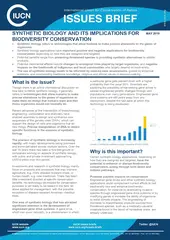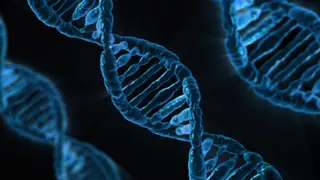Risks and opportunities of using synthetic biology in nature conservation
The Convention on Biological Diversity defines synthetic biology as “a further development and new dimension of modern biotechnology that combines science, technology and engineering to facilitate and accelerate the understanding, design, redesign, manufacture and/or modification of genetic materials, living organisms and biological systems”.
This is important for nature conservation.
On the one hand, synthetic biology could impose new risks for nature. Implemented or governed poorly, it could, for example, introduce unwanted genetic traits into native species, jeopardising their persistence. Other risks could be indirect, such as through use of synthetic biology to open new agricultural frontiers, threatening biodiversity through land conversion.
On the other hand, synthetic biology could open new opportunities for nature conservation. For instance, it may offer solutions to currently unsolvable threats to biodiversity, such as those caused by invasive alien species and diseases. Such opportunities could also be indirect, perhaps through allowing sustainable intensification of agriculture and thus reducing pressure on natural ecosystems elsewhere.
Challenges in developing a policy on synthetic biology and nature
Shaping a coherent nature conservation policy on synthetic biology is challenging for multiple reasons. The technology is expanding extremely rapidly. Collaboration between countries is essential, as is collaboration across levels of governance from indigenous peoples and local communities through to multilateral environmental agreements. The subject is complex, and misconceptions are rife. Maybe most challenging, the issue is highly polarised across the conservation community (and society as a whole), with small proportions of conservationists strongly opposed to or supportive of the technology, and many as-yet-un-decided what the best policies might be.
IUCN’s process to date in developing its policy for synthetic biology and nature conservation
At the IUCN World Conservation Congress in Hawai‘i, USA, in September 2016, IUCN Members adopted WCC 2016 Res 086. This Resolution mandated the development and publication of an assessment on synthetic biology and biodiversity conservation, under the authority of the Chairs of all six of IUCN’s independent expert Commissions, and the IUCN Director General.
This assessment was published in 2019 as “Genetic Frontiers for Conservation”, with an accompanying “Synthesis and Key Messages” for policy-makers.
Building from this, the IUCN World Conservation Congress in Marseille, France, in September 2021 adopted WCC 2020 Res 123, establishing a process for development of an IUCN policy, to include both an inclusive process across the Union and the appointment of a Policy Development Working Group.
IUCN Council deliberated the Resolution at Part I of their 108th Meeting, online in November 2022. Their Decision C108/2 approved both a detailed process for implementation of the Resolution, and Terms of Reference for specific bodies to be involved.
IUCN Council further discussed the process in their 109th Meeting in Gland, Switzerland in May 2023, and their Decision C109/8 approved a revised process for implementation of the Resolution and revised Terms of Reference for the specific bodies involved. This documentation adds specification to the details of the inclusive process (including for it to encompass a “Citizens’ Assembly” established through stratified random selection from across the IUCN Membership, and now underway) and of the Policy Development Working Group. The process of appointment of the Policy Development Working Group members ran from June through October 2023, with appointments finalised by the IUCN President on 13 October 2023. The International Centre for Genetic Engineering and Biotechnology has now been recruited, through the IUCN procurement process, to provide training and facilitation services to the process. Additionally, a call for information was run from June through August 2023; IUCN is very grateful to those constituents who provided information in response.
The IUCN Citizens’ Assembly on Synthetic Biology in relation to Nature Conservation, as the first element of the inclusive and participatory process for implementation of WCC 2020 Res 123, convened participants from IUCN Members selected in a stratified random fashion according to Member category, Statutory region, and gender. It undertook a training workshop in Nairobi, Kenya, 19–26 November 2023, followed by a deliberation workshop in Bangkok, Thailand, 21–28 February 2024, where it produced recommendations for the Policy Development Working Group. The other elements of the inclusive and participatory process will proceed over 2024.
The rest of the inclusive and participatory process is supported by a guidance document, an introductory video, and a briefing document on what synthetic biology is and why its implications for nature conservation require inclusive debate, these are available to all IUCN Members on IUCN Engage (login required). This process solicits input from all IUCN constituents, in particular through the IUCN National, Regional, and Interregional Committees, the IUCN Regional Conservation Fora, the IUCN Commissions, and the IUCN Indigenous Peoples’ Organisation Members, with IUCN Engage providing a feedback template for IUCN constituents to share their inputs.
Funding for development of the IUCN policy on synthetic biology and nature conservation
To date, generous contributions towards funding the development of the IUCN policy on synthetic biology and nature conservation have been provided by the Federal Ministry for the Environment, Nature Conservation, Nuclear Safety and Consumer Protection of the Government of Germany, and the Gordon and Betty Moore Foundation. More generally, the IUCN Council has endorsed a request for financial support in implementing the Resolution, sent by the IUCN Director General to IUCN Government Members and philanthropic foundations. This solicitation remains open to ensure sufficient resource mobilisation, with the anticipation that a draft IUCN Policy on Synthetic Biology and Nature Conservation is ready for consideration by the IUCN Membership at the 2025 IUCN World Conservation Congress.
Importantly, IUCN is not approaching private sector and campaigning organisations for financial support, to reduce any risk of perceived conflict of interest.



